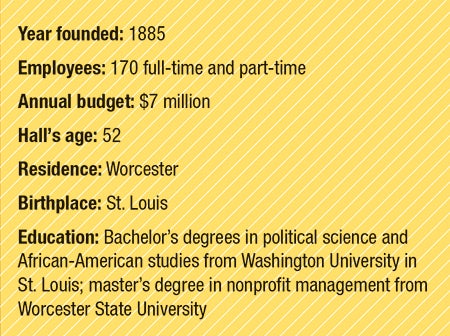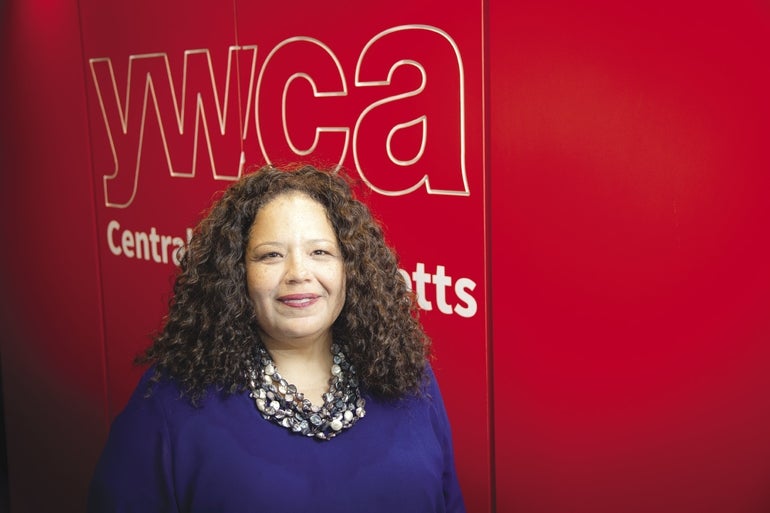On July 1, Debbie Hall took over leadership of YWCA Central Massachusetts, succeeding Linda Cavaioli, who retired after leading the nonprofit and being an outsized voice in the Central Massachusetts community for 30 years. Hall was promoted from within, as she most recently was YWCA’s director of domestic violence services.
Get Instant Access to This Article
Subscribe to Worcester Business Journal and get immediate access to all of our subscriber-only content and much more.
- Critical Central Massachusetts business news updated daily.
- Immediate access to all subscriber-only content on our website.
- Bi-weekly print or digital editions of our award-winning publication.
- Special bonus issues like the WBJ Book of Lists.
- Exclusive ticket prize draws for our in-person events.
Click here to purchase a paywall bypass link for this article.
On July 1, Debbie Hall took over leadership of YWCA Central Massachusetts, succeeding Linda Cavaioli, who retired after leading the nonprofit and being an outsized voice in the Central Massachusetts community for 30 years. Hall was promoted from within, as she most recently was YWCA’s director of domestic violence services.

How have your first few months gone?
It is going well. We have a great board of directors, and a very supportive community. Linda Cavaioli was an incredible leader here for 30 years, and we had a great transition with me into being executive director. The entire organization is adjusting well to the change. We are a big organization doing a lot of great things for the community.
How has it been taking over for someone like Linda Cavaioli?
I’ve gotten that question quite a bit. Linda had a huge impact on the organization and the community, and she and I view it as a passing of the baton. I consider her a mentor, and she left me in good hands with a strong organization with many great people.
At the same time, we often talk about charting your own course. I will be doing that as I grow into the role, but ultimately our mission is about empowering women.
What have been your first priorities?
Immediately, we are coming off of someone who has been in this position for 30 years. What is important for me is not having any negative disruptions for our organization or our community. We’ve been doing good where we have avoided those. Right now, I’m out in the community, meeting our partners and various people, making sure everything is flowing smoothly.
I’m not planning any major restructuring to the organization. So far, it has been minor things inside of departments. Maybe I’ll revisit that in the upcoming months.
We are going to start our strategic planning next year to figure out how YWCA will provide services over the following five years.
What is YWCA’s core programming?
YWCA has always been at the forefront of equity work in our community, both race equity and empowering women. Some of the priority areas are putting together programming targeting girls and girls of color.
Providing housing, child care, and shelter from domestic violence to at-risk communities has been part of YWCA for a long time, but the coronavirus pandemic really increased the needs for those services, especially with the increase in domestic violence. There have been a lot of murder-suicides.
Another area we serve that has been hitting our community really hard is child care. Because they can’t find anyone to watch their children, women have struggled with going back to work during COVID.
How is demand for your services now, 18 months into the pandemic?
Most of our employees had to rethink work and how we are going to get work done. Most of our departments went to remote work in March 2020, and we had to switch much of our services to virtual. Some services couldn’t go virtual, such as child care and domestic violence.
Particularly with domestic violence, the home was the most dangerous place to be. We knew domestic violence was increasing, but people were sheltering in place with their abusers, so the violence wasn’t getting reported. So, to see the impact, we had to wait to see how the numbers came through this year. Turns out, our numbers for domestic violence incidents increased almost double – 98% – this year compared to last year.
As we continue to think about how we offer services as we might be coming out of COVID, people are telling us what worked for them. We are still figuring those things out. Even with employees, we are figuring out who works from home and how they can do it.
I’m happy to say our services were not interrupted.
What new efforts came as a result of the pandemic?
With the COVID vaccine, we were able to participate in equity clinics. As the vaccine started to roll out, we worked with certain populations in order to make them feel safe and comfortable so they could get the vaccine.
There were all sorts of ways we responded to COVID, and we were trying to figure out how COVID changed us. We have our after-school programs now, but people are still trying to figure out how to keep the children as safe as possible, too.
We have been working with partners, and everyone was so giving in trying to figure out the needs of the community.
The pandemic feels like a distant memory, but at the same time it is still very much here with us.
This interview was conducted and edited for clarity and length by WBJ Editor Brad Kane.

